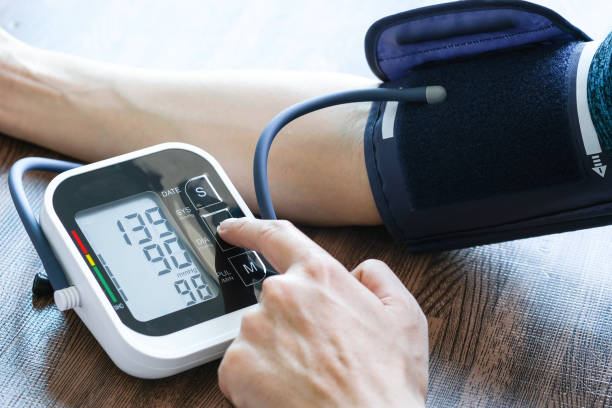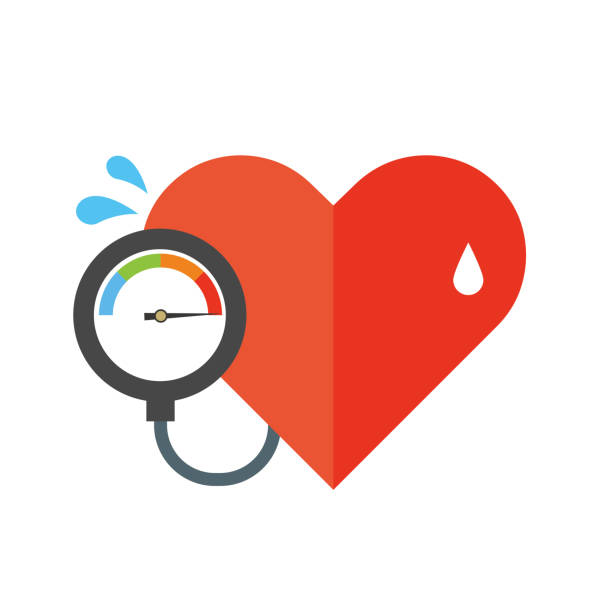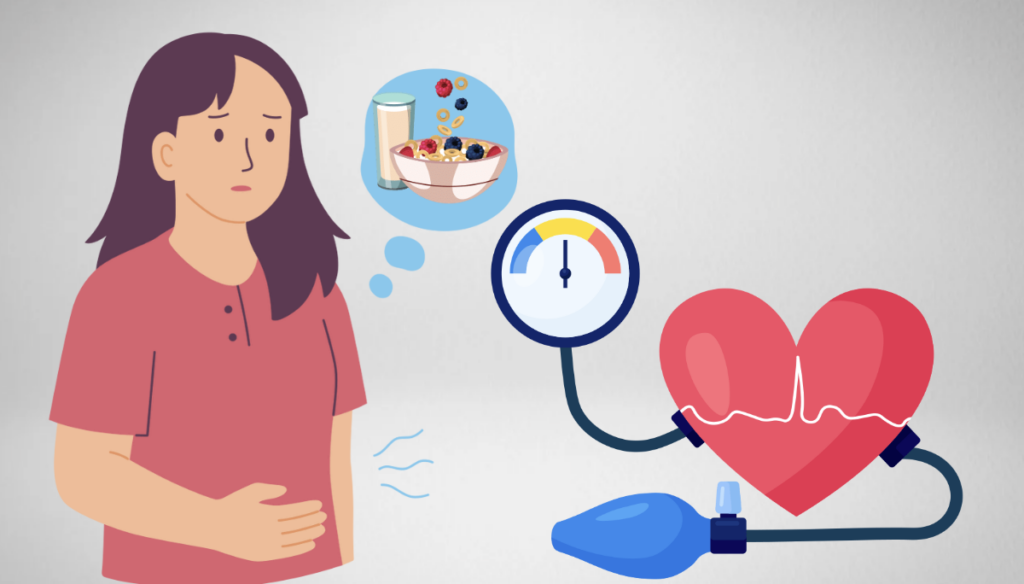Heart Health
Skipping Breakfast Linked to High Blood Pressure?
Breakfast is frequently regarded as the most essential meal of the day, and with good reason. It gives your body the energy and nourishment it needs to start the day. A well-balanced breakfast meal can help to regulate your blood pressure.
Skipping breakfast depletes your body’s supply of important nutrients, vitamins, and minerals. These nutrients are essential for maintaining normal blood pressure levels. Without them, your body may struggle to operate properly, which can lead to issues like high blood pressure.
Furthermore, breakfast provides an opportunity to recover energy after an overnight fast. When you wake up in the morning, your body has gone several hours without nourishment. Breakfast refuels your body, giving it the energy it needs to execute daily tasks. This energy boost helps your cardiovascular system work properly, which is important for regulating blood pressure.
A well-balanced breakfast also helps to keep blood sugar levels stable. When you eat in the morning, your body is better able to regulate glucose levels throughout the day. This, in turn, helps to maintain appropriate blood pressure by preventing blood sugar spikes and crashes.
Overall, breakfast is more than just satisfying hunger; it is an important part of a healthy lifestyle, including blood pressure management. Starting the day with a good meal gives your body the resources it needs to keep your blood pressure under control.

The Link Between Breakfast Skipping and High Blood Pressure
Numerous research have looked into the potential link between skipping breakfast and high blood pressure. While further research is needed to completely understand the mechanisms underlying this association, current evidence suggests that there may be a correlation.
One research published in the journal Hypertension monitored more than 4,000 people for several years. The researchers discovered that people who habitually skipped breakfast had a higher chance of acquiring high blood pressure than those who ate breakfast on a regular basis. This connection persisted even after accounting for other variables such as age, gender, BMI, and smoking status.
Another study conducted in Japan investigated the link between breakfast skipping and hypertension in young individuals. The findings revealed that people who skipped breakfast had a considerably higher risk of developing hypertension than those who ate breakfast on a regular basis. This connection persisted even after controlling for lifestyle characteristics such as smoking, alcohol intake, and physical exercise.
While these studies give useful information, it should be noted that they establish a connection rather than causality. In other words, skipping breakfast does not directly cause high blood pressure, but it can increase the risk. Other factors that influence the development of hypertension include heredity, age, stress, and general diet.
Understanding the probable link between skipping breakfast and high blood pressure might help people make more educated decisions regarding their lifestyle and diet. Individuals who incorporate a healthy breakfast into their daily routine may be able to minimize their chances of developing hypertension while also improving their overall cardiovascular health.

Other Factors That Contribute to High Blood Pressure
While skipping breakfast may have an effect on blood pressure levels, it is critical to examine other factors that can lead to hypertension. Understanding these characteristics can assist individuals in developing a complete approach to regulating their blood pressure and overall cardiovascular health.
Sedentary behavior
Lack of physical exercise can cause weight gain, which is a known risk factor for high blood pressure. Regular exercise, on the other hand, can aid in maintaining a healthy weight and improving cardiovascular health.
Dietary choices
What you eat plays an important influence in blood pressure management. A diet heavy in sodium, processed foods, and sugary beverages can raise blood pressure. On the contrary, a diet high in fruits, vegetables, whole grains, lean proteins, and healthy fats can help maintain normal blood pressure.
Stress
Feeling stress is another component that might affect blood pressure. Chronic stress can trigger the release of stress hormones, which can impair blood vessel function and raise blood pressure. Finding good coping mechanisms and stress-reduction techniques, such as exercise, meditation, or spending time with loved ones, can assist to manage stress and improve cardiovascular health.
Genetics and family history
The family history and genetics influence blood pressure management. If you have a family history of hypertension, you must be proactive in regulating your blood pressure through lifestyle changes and regular check-ups with a healthcare expert.
Individuals can take a more holistic approach to blood pressure management and cardiovascular health by taking these aspects into account, as well as the potential consequence of skipping breakfast.
The Importance of a Balanced Diet for Blood Pressure Management
A well-balanced diet is essential for maintaining blood pressure. While breakfast is crucial, it is also necessary to focus on overall nutritional choices throughout the day to maintain healthy blood pressure levels.
Fruits and vegetables
A diet high in contains vital vitamins, minerals, and antioxidants that improve cardiovascular health. These foods have little sodium and a lot of potassium, which can help manage blood pressure. Incorporating a range of colored fruits and vegetables into your meals and snacks will help you maintain a balanced diet.
Whole grains
Oats, quinoa, and brown rice can also help with blood pressure management. These grains are high in fiber, which can help reduce cholesterol and improve general heart health. Choosing whole grain bread, cereals, and pasta over refined grains can significantly improve blood pressure regulation.
Lean Proteins
A good balanced diet should include lean proteins including poultry, fish, beans, and legumes. These protein sources are low in saturated fat and contain essential nutrients such as omega-3 fatty acids. Omega-3s have been shown to improve blood pressure and cardiovascular health.
Healthy Fats
Avocados, almonds, and olive oil provide healthy fats that can help with blood pressure management. These fats can help reduce inflammation and cholesterol levels, resulting in a healthier cardiovascular system.
Finally, minimize your consumption of sodium, processed meals, sugary drinks, and alcohol. These things may lead to high blood pressure and should be consumed in moderation. Individuals can help manage their blood pressure and improve their overall cardiovascular health by eating a well-balanced diet that includes these components.

Tips for Incorporating a Healthy Breakfast into Your Routine
Incorporating a healthy breakfast into your daily schedule may appear difficult, especially if you are constantly on the move. However, with a few simple techniques and strategies, you can make breakfast a priority and improve your blood pressure and overall health.
Plan ahead
Take a few minutes each evening to arrange your breakfast for the following day. This can include making overnight oats, slicing fruits, or assembling a basic breakfast sandwich. Having a strategy in place helps you keep to a healthy breakfast routine.
Make it convenient
Choose breakfasts that are quick and simple to make. Consider Greek yogurt with berries and almonds, whole grain toast with avocado and eggs, or a smoothie loaded with fruits, vegetables, and protein. These options can be prepared in minutes and consumed on the road.
Batch cook
If you have time, consider batch cooking breakfast dishes over the weekend. This can involve creating a large batch of healthy muffins, frittatas, or breakfast burritos that can be refrigerated or frozen. Simply reheat and enjoy all week.
Set a schedule
Creating a consistent breakfast habit can help you prioritize this meal. Try to get up a few minutes early to make time for breakfast preparation and pleasure. Making breakfast a non-negotiable element of your morning routine increases your chances of sticking with it.
Experiment with flavors
Make breakfast more interesting by testing various recipes and taste combinations. Explore different grains, fruits, and proteins to make a range of breakfast options. This can assist to avoid monotony and make breakfast something you look forward to every day.
Remember that breakfast is an investment in your overall health, including blood pressure management. By adding these suggestions into your routine, you may make breakfast a habit that benefits your entire health.
Other Lifestyle Changes to Consider for Managing High Blood Pressure
While a nutritious breakfast is a vital part of blood pressure management, it is frequently only one piece of the jigsaw. Making extra lifestyle modifications can help you maintain healthy blood pressure levels.
Regular physical activity
Essential for cardiovascular health and blood pressure management. Aim to complete at least 150 minutes of moderate-intensity exercise per week. This can include activities like vigorous walking, cycling, swimming, and dancing. Find activities you enjoy and incorporate them into your normal schedule.
Stress management
Managing stress is very important in blood pressure management. Find healthy ways to deal with stress, such as mindfulness, hobbies, or spending time outdoors. Prioritizing self-care and taking time to relax can improve your overall well-being.
Limiting alcohol consumption
Drinking less alcohol is essential for blood pressure management. Excessive alcohol use can lead to high blood pressure and other health issues. If you choose to drink, do it in moderation, with a maximum of one drink per day for women and two drinks per day for men.
Quitting smoking
Quitting from smoking is one of the most significant lifestyle adjustments you can make to improve your cardiovascular health. Smoking harms blood arteries, elevates blood pressure, and increases the risk of heart disease. If you need help quitting, seek support from healthcare professionals or smoking cessation programs.
Maintain a Healthy Weight
Maintaining a healthy weight is crucial for blood pressure control. If you are overweight or obese, even a tiny amount of weight loss can improve your blood pressure. Incorporate healthy eating habits and frequent exercise to help you lose weight.
Monitor Blood Pressure
Blood pressure should be monitored on a regular basis to better understand your health status. Schedule regular check-ups with your healthcare practitioner to get your blood pressure checked and any problems or issues addressed.
Combining a healthy breakfast routine with these lifestyle modifications allows you to adopt a more complete approach to blood pressure management and boost overall cardiovascular health.

When to Seek Medical Advice for High Blood Pressure Concerns
If you are concerned about your blood pressure or believe you may have hypertension, you should seek medical attention. While lifestyle adjustments, such as eating a nutritious breakfast, can help regulate blood pressure, medical intervention may be required in some circumstances.
Your healthcare professional can review your blood pressure measurements, analyze your general health, and recommend the best course of action. They may recommend additional lifestyle changes, prescribe medication if needed, or refer you to a specialist for further examination.
It is especially vital to get medical attention if you have severe headaches, dizziness, chest pain, or shortness of breath. These could suggest a more serious condition that requires rapid attention.
Remember, managing high blood pressure is a process that necessitates a multifaceted approach. While including a healthy breakfast into your daily routine is beneficial, it should be paired with other lifestyle modifications and regular medical monitoring to achieve optimal blood pressure management.
In conclusion, skipping breakfast may have implications for my blood pressure levels. Studies suggest that regularly skipping breakfast could potentially contribute to elevated blood pressure readings. By not eating breakfast, my body misses out on essential nutrients, energy, and the opportunity to stabilize blood pressure throughout the day.
Trusted Health, Wellness, and Medical advice for your well-being


